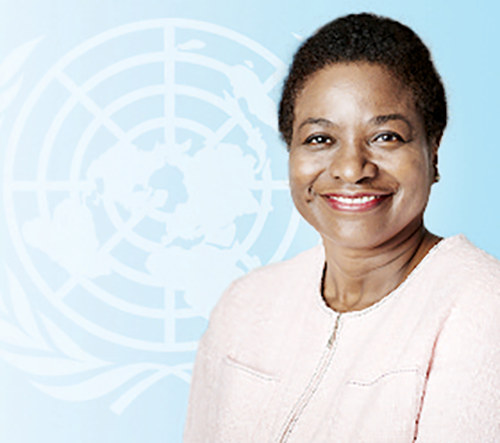News
Nearly a third of all women in developing countries become mothers during adolescence

UNITED NATIONS,New York – Almost one third of women in developing countries had their first baby while they were still in their teens, a recently released report shows, with nearly half of those new mothers aged 17 and younger – still children themselves.
Gender-based and income inequalities are highlighted as key in fuelling teen pregnancies by increasing child marriage rates, keeping girls out of school, restricting their career aspirations, and limiting health care and information on safe, consensual sex. Entrenching these inequalities are climate disasters, COVID-19 and conflict, which are all upending lives around the world, obliterating livelihoods and making it more difficult for girls to afford or even physically reach school and health services. This leaves tens of millions yet more vulnerable to child marriage and early pregnancy.
“When nearly a third of all women in developing countries are becoming mothers during adolescence, it is clear the world is failing adolescent girls,” said UNFPA Executive Director Dr. Natalia Kanem. “The repeat pregnancies we see among adolescent mothers are a glaring signpost that they desperately need sexual and reproductive health information and services.”
Most births among girls under the age of 18 in 54 developing countries are reported as taking place within a marriage or union. Although more than half of those pregnancies were classified as “intended”, young girls’ ability to decide whether to have children can be severely constrained. Indeed, the report finds that adolescent pregnancy is often – albeit not always – driven by a lack of meaningful choice, limited agency, and even force or coercion.
Even in contexts where adolescent motherhood is considered acceptable and planned for, it can carry serious and long-term repercussions, especially when health-care systems fail to ensure accessible sexual and reproductive care and information for this vulnerable age group.
Complications in pregnancy and childbirth are the leading cause of death among girls aged 15 to 19 years, who are also far more likely to suffer a litany of other violations of their human rights, from forced marriage and intimate partner violence to serious mental health impacts of bearing children before they are out of childhood themselves.
Almost one third of women in developing countries had their first baby while they were still in their teens, a recently released report shows, with nearly half of those new mothers aged 17 and younger – still children themselves.
Gender-based and income inequalities are highlighted as key in fuelling teen pregnancies by increasing child marriage rates, keeping girls out of school, restricting their career aspirations, and limiting health care and information on safe, consensual sex.
Entrenching these inequalities are climate disasters, COVID-19 and conflict, which are all upending lives around the world, obliterating livelihoods and making it more difficult for girls to afford or even physically reach school and health services. This leaves tens of millions yet more vulnerable to child marriage and early pregnancy.
“When nearly a third of all women in developing countries are becoming mothers during adolescence, it is clear the world is failing adolescent girls,” said UNFPA Executive Director Dr. Natalia Kanem. “The repeat pregnancies we see among adolescent mothers are a glaring signpost that they desperately need sexual and reproductive health information and services.”
Most births among girls under the age of 18 in 54 developing countries are reported as taking place within a marriage or union. Although more than half of those pregnancies were classified as “intended”, young girls’ ability to decide whether to have children can be severely constrained. Indeed, the report finds that adolescent pregnancy is often – albeit not always – driven by a lack of meaningful choice, limited agency, and even force or coercion.
Even in contexts where adolescent motherhood is considered acceptable and planned for, it can carry serious and long-term repercussions, especially when health-care systems fail to ensure accessible sexual and reproductive care and information for this vulnerable age group.
Complications in pregnancy and childbirth are the leading cause of death among girls aged 15 to 19 years, who are also far more likely to suffer a litany of other violations of their human rights, from forced marriage and intimate partner violence to serious mental health impacts of bearing children before they are out of childhood themselves.
Girls who give birth in adolescence also often go on to have more than one baby in quick succession – which can be dangerous both physically and psychologically. Among those who first gave birth at age 14 or younger, nearly three quarters had a second baby before they turned 20, and a staggering 40 per cent of those had a third before they left their teens.
Adolescent births now account for 16 per cent of all births in the world, and the report shows women who began childbearing in adolescence had almost five births by the time they reached age 40. With inequalities and humanitarian crises multiplying and intensifying, we know women and girls are bearing an unequal burden of the consequent physical, psychological and economic turmoil.
In conflict as in climate disasters, schools and health facilities are frequently reduced to rubble and devoid of staff and equipment. Insecurity and violence render it impossible for people to move around even for basic necessities, including contraception and other critical sexual and reproductive health care.
Crises and displacement are also known to lead to spikes in gender-based and sexual violence, in turn causing more sexually transmitted infections, unwanted pregnancies from rape, and rising rates of forced and child marriages as parents struggle to cope with financial hardship and aching hunger. Under these circumstances, access to employment, education and health services is disrupted or suspended entirely, pushing girls out of school, women out of the workforce and leading child marriages and unintended pregnancies to soar.
News
AKD’s fourth state visit

President Anura Kumara Dissanayake will undertake a four-day state visit to Vietnam on 03 May, Cabinet Spokesman Minister Dr. Nalinda Jayatissa said. Since the presidential election, President Dissanayake has so far visited India, China and the UAE.
News
Sri Lanka-Pakistan bilateral defence dialogue strengthens strategic ties – MoD

The 5th annual Sri Lanka-Pakistan Bilateral Defence Dialogue commenced on Monday (April 28) in Islamabad, Pakistan, marking a continued commitment to strengthening defence cooperation between the two nations.
The MoD statement: “The Sri Lankan delegation is led by Defence Secretary Air Vice Marshal (retd.) Sampath Thuyacontha accompanied by Commander of the Navy, Vice Admiral Kanchana Banagoda, and Additional Secretary (Defence) of the Ministry of Defence Jayantha Edirisinghe. The Pakistani delegation is headed by Lieutenant General (retd.) Muhammad Ali, Secretary Defence of the Islamic Republic of Pakistan.
In conjunction with the on-going defence dialogue, Defence Secretary Thuyacontha held a side-line meeting yesterday (April 29) with Defence Minister of Pakistan, Khawaja Muhammad Asif.
These high-level engagements aim to enhance bilateral cooperation, foster mutual understanding on regional security dynamics and explore opportunities for defence collaboration. Both nations share a longstanding relationship rooted in mutual respect and strategic cooperation. The dialogue reflects the growing importance of partnerships in maintaining stability and promoting peace in the South Asian region.
The three-day dialogue, which concludes today (April 30), is expected to reinforce bilateral defence ties and contribute to broader regional security objectives.
News
FS officers receive training on disarmament

The Ministry of Foreign Affairs, Foreign Employment and Tourism, in collaboration with the United Nations Institute for Disarmament Research (UNIDIR), conducted a two day seminar on disarmament for Sri Lanka Foreign Service Officers on 25 and 26 April, 2025 at the Ministry. The text of the FM statement: “Over 40 officers, based in Colombo, attended the workshop physically while over 60 officers, attached to Sri Lanka Missions abroad, followed the Seminar virtually.
Director of UNIDIR, Dr. Robin Geiss, Senior Researcher at the UNIDIR Security and Technology Programme, Dr. Dongyoun Cho, and Associate of Political Affairs, Ms. Fanny Sebban of UNIDIR, conducted the Seminar as resource personnel. They shared their expertise and perspectives on the global disarmament landscape and evolving threats to international peace and security, etc.
Director of UNIDIR, Dr. Robin Geiss, called on Minister of Foreign Affairs, Foreign Employment and Tourism, Vijitha Herath and discussed closer cooperation between the Ministry and UNIDIR.
The Human Resource Development, Research & Training Division and the United Nations and Human Rights Division of the Ministry organised the Seminar initiated by the Permanent Mission of Sri Lanka to the United Nations in Geneva.”
-

 Business3 days ago
Business3 days agoPick My Pet wins Best Pet Boarding and Grooming Facilitator award
-

 News3 days ago
News3 days agoNew Lankan HC to Australia assumes duties
-

 Features3 days ago
Features3 days agoKing Donald and the executive presidency
-

 Business3 days ago
Business3 days agoACHE Honoured as best institute for American-standard education
-

 News3 days ago
News3 days agoLankan ‘snow-white’ monkeys become a magnet for tourists
-

 Features5 days ago
Features5 days agoThe Truth will set us free – I
-

 Business1 day ago
Business1 day agoNational Savings Bank appoints Ajith Akmeemana,Chief Financial Officer
-

 Business5 days ago
Business5 days agoPositive take on US-SL talks on tariff question buoys bourse












